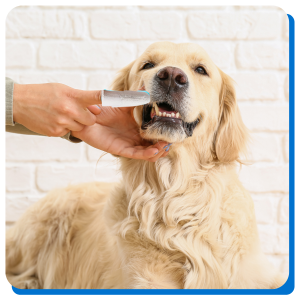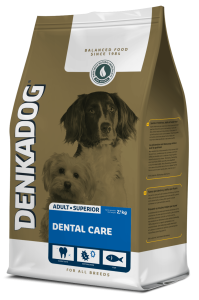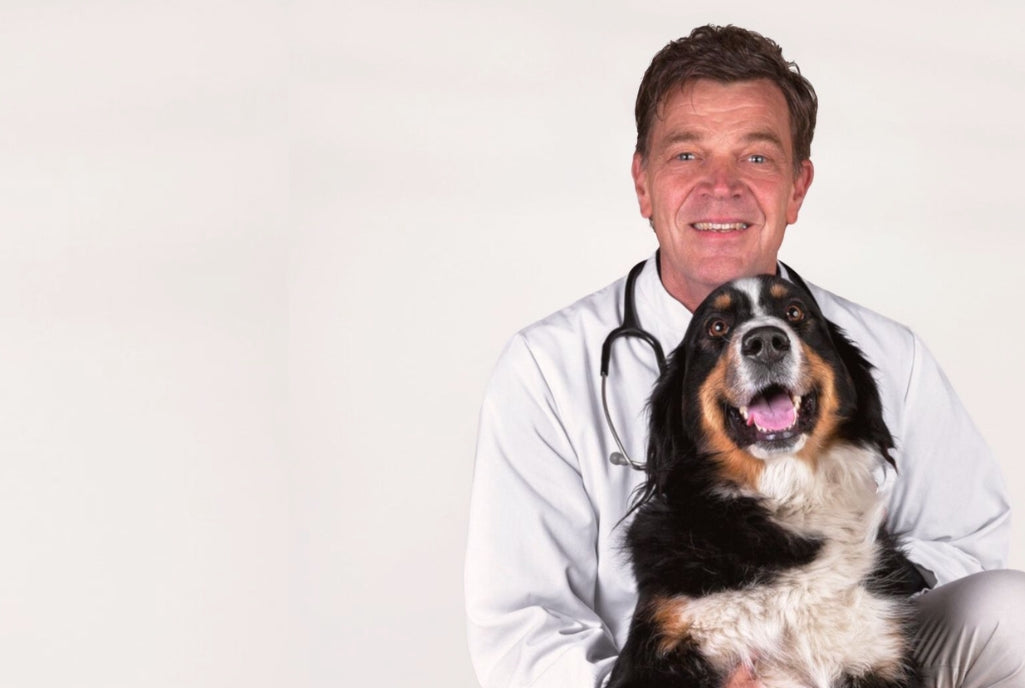Brushing dogs' teeth
Dogs have more dental problems than most people think. Dental problems are among the most common conditions in dogs. Brushing dogs' teeth is therefore certainly important. It is a misunderstanding that it is normal for a dog to have bad breath. 1 in 4 dogs suffer from bad breath. In many cases, this is an indication of a dental problem. Bad breath can be caused by leftover food or the type of food (tripe, for example), but then the smell quickly disappears. If the bad breath is chronic, it can be the result of inflamed gums. It is therefore important to care for your pet's teeth daily and to have them checked regularly. With the right care, you can prevent dental problems in your dog.

Easily solve dental problems with nutrition
The 7 Benefits of Denkadog Dental Care
- Prevents the growth of tartar.
- Enriched with sodium tripolyphosphate, which prevents the lime in the saliva from sticking and prevents tartar from forming.
- The fish oil in the food has an anti-inflammatory effect.
- Cures bad breath.
- Helps to maintain healthy and fresh teeth.
- The small crunchy chunks promote fresh and healthy teeth.
- Your dog will automatically chew its teeth clean (better).
- Want to know more about the composition...
For whom? For adult dogs with dental problems or dogs that are sensitive to this.
Why? Helps maintain healthy, fresh teeth. Prevents and reduces tartar and bacterial growth.
Benefits? Promotes clean teeth and fresh breath.
To achieve optimal results, it is a good idea to brush your dog's teeth regularly.

How do you prevent or delay your dog from having problems with his teeth?
If you do not take proper care of your dog's teeth, this can lead to plaque and gum inflammation and, in the worst case, teeth falling out. The formation of tartar can cause your dog to have problems with its teeth. Dental problems are mainly caused by plaque that is converted into tartar after just 24 hours. It consists of food residues, mucus and bacteria. Plaque is a barely visible layer that is constantly forming on the teeth. If this is not removed, plaque calcifies into tartar within 24 hours. Plaque and tartar damage the mucous membrane around the teeth and molars. As a result, teeth and molars can become loose and fall out.
Bacteria can cause inflammation elsewhere in the body (kidneys, liver and heart valves). Bacteria from dental plaque can travel via the bloodstream to the heart and kidneys, for example, in the event of inflammation of the gums. The bacteria from the teeth can cause inflammation of the heart valve or abnormalities in the kidneys. Neglected teeth can have serious consequences. This is often recognisable by a nasty smell from the mouth. Without intervention, the bacteria that form in the mouth can also cause inflammation of the kidneys, liver and heart.
Because the approach is aimed at the formation of tartar, it is important that attachment to the tooth surface becomes difficult. Regular removal of this thin layer prevents attachment. Dental plaque is accompanied by bacterial growth in the mouth and can eventually lead to painful inflammation.
If your dog is still suffering from tartar, it can be removed by the vet. He will perform a dental cleaning under anesthesia.
Clean teeth in 10 steps
-
- Choose a fixed time: for example, brushing your teeth after your evening walk.
- Gently grasp the snout.
- After this the mouth must open.
- Grasp the jaw and look at the teeth by lifting the lip.
- Now you can brush your dog's teeth with the special dog toothbrush.
- Clean the teeth from the corners of the mouth forward.
- To relax while brushing, you can stroke the ears with the palm of your hand.
- Gently massage the teeth.
- When you are done, reward the dog.
- You will achieve the best results by repeating this every day.
Experiences with Denkadog Dental Care and brushing teeth for dogs
Stafford bull terrier Ziggy
Ziggy, a 3.5 year old Stafford Bull Terrier, develops tartar (limescale) on the canine teeth. Ziggy is advised to brush his teeth with a sock on his finger in combination with Denkadog Dental Care food. The Dental Finger prevents tartar because the surface of the teeth remains smooth and the food takes the lime in the saliva into the stomach and intestines, so that it cannot form tartar.
Dachshund Hummer
Hummer, a castrated dachshund of 8 years old, stinks from his mouth. There is a lot of tartar present. The advice of the vet is treatment at the clinic. After that he can eat Denkadog Dental Care and his teeth are cleaned at least 2 x per week with the Dental Finger and dental cleaner.
Boomer Bert
Bert is a castrated boomer of 7.5 years old. His teeth are stuck together by tartar. His mouth stinks. Advice from the vet is a dental treatment. After this, brush with the Dental Finger in combination with the dental cleaner to prevent recurrence. All this in combination with the Denkadog Dental Care food.
Frisian Staby Pom
Pom, a Frisian Stabyhoun of 7 years old, is happy and doing well. However, tartar is forming on the canine teeth. This can still be brushed away with the Dental Finger and denture cleaner.
Boomer Pepsi
Pepsi is a cute Boomer of 6 kg and 4 years old. She has tartar on the canines. She is now getting a dental stick, but that apparently does not work. The chewing bones such as dental stick only work on the molars. Now the advice is to start brushing with Dental Finger and also give the food Denkadog Dental Care. The vet also gives the tip to keep an eye on her not to get too heavy because of the Dental Sticks.
Brushing dogs' teeth is therefore certainly important and requires little effort.
Advice from the vet
Brush your dog's teeth to prevent tartar from adhering. If your dog suffers a lot from plaque and tartar, give our special food.
Chew bones only work on the molars. It is important to take good care of your dog's teeth and check them regularly.
Also read: How do you care for your dog's teeth ?
Follow us on Social Media







